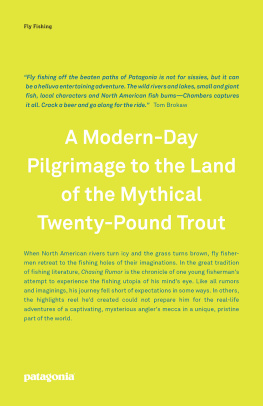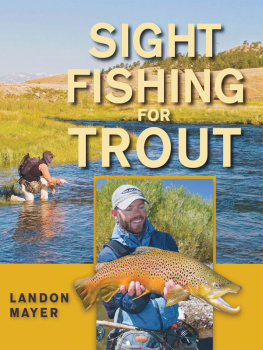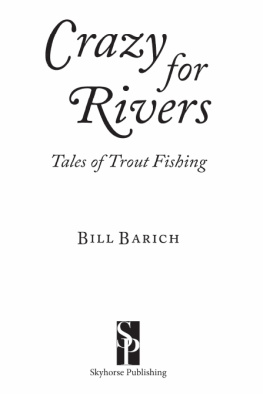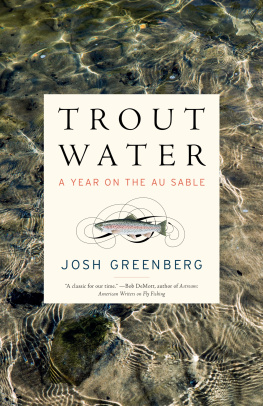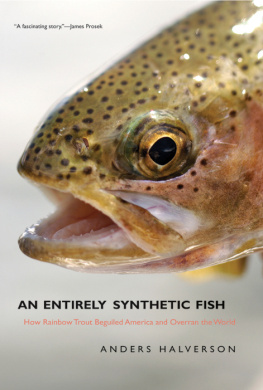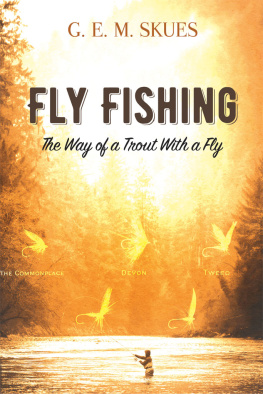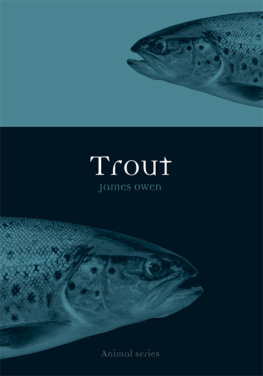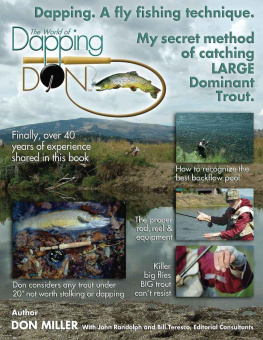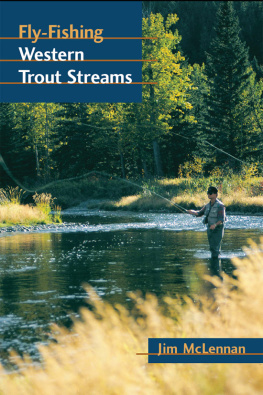CHASING RUMOR
A Season Fly Fishing in Patagonia
A Season Fly Fishing in Patagonia
CHASING RUMOR
CAMERON CHAMBERS
patagonia Ventura, California
CHASING RUMOR A Season Fly Fishing in Patagonia
Patagonia publishes a select number of titles on wilderness, wildlife, and outdoor sports that inspire and restore a connection to the natural world. You can find our books in your local bookstore and online and in our Patagonia stores, or the full list is available on Patagonia.com.
Copyright 2015 Patagonia Works
Text: Cameron Chambers
Illustrations: Andrew Holder
Design: Haruna Madono
Editor: John Dutton
Production: Rafael Dunn and Jordan Damron
All rights reserved. No part of this book may be used or reproduced in any manner whatsoever without written permission from the publisher and copyright holders. Requests should be mailed to Patagonia Books, Patagonia, Inc., 259 W. Santa Clara St., Ventura, CA 93001-2717
First Edition
ISBN 978-1-938340-40-6
E-Book ISBN 978-1-938340-41-3
Library of Congress Control Number 2015937490

One percent of the sales from this book go to the preservation and restoration of the natural environment. Printed in Canada on 30% recycled paper
Contents
INTRODUCTION

If our lives are dominated by a search for happiness, then perhaps few activities reveal as much about the dynamics of the questin all its ardour and paradoxesthan our travels. They express however inarticulately, an understanding of what life might be about, outside the constraints of work and the struggle to survive.
Alain de Botton, The Art of Travel
T his is a book about Patagonia. Not just the fishing in Patagonia, for if it was that sort of book, far more might be accomplished with bright pictures. As it stands, this is a book about Patagonia experienced by an angler, but by no means limited to the recounting of fish yarns. Trout are newcomers to the Patagonian landscape and are as much a story in themselves of pioneers, nation building, ecosystems, industry, the goddess Fortuna, and more than any of thesepersonalities. Following these story lines, these pages are an exercise in experience and storytelling and, by way of necessity, rooted in rumor. And I can think of no better place for a story of a land and its fish to be rooted, because rumor is the medium of all good fish stories.
In keeping with this theme, this story of Patagonia does not begin on the arid steppe and a desolate Southern Hemisphere river, but in Montana, where, as the heart of my fly-fishing universe, rumors collect themselves, especially in winter. The story soon makes its way to a tent, a puke bucket, and a desolate river on the edge of Patagonia, but skipping the rumors that landed me there would degrade the story from that of a fish story to just a story.
And so I found myself at the beginning of an adventure by staring out the kitchen window at the brown grass and changing leaves of a Montana fall. That is as wonderful a time for a fly fisherman as one could hope forexcept for the knowledge that the next big cold front from Canada could start the forces of winter at work piling snow and ice on the riverbanks. With the ice and snow come the numbness of frozen fingers, the frustration of frozen rod guides, and the bone-chilling cold of winter wading. These conditions are manageable, and even on the coldest days a person finds willing fish. But doable and optimal are not the same when speaking of winter fly fishing. Its for this reason that rumors find their way to Montana in the fall, where they are appreciated and nurtured by those uncomfortable with the knowledge of looming ice and snow.
The rumors we pay attention to this time of year split into two categories: New Zealand and Patagonia. New Zealand is said to have troutbig, smart, picky trout. As a utopian escape, a location with big, dumb, aggressive trout seems better. Patagonia is a region; its borders are not hard-and-fast political boundaries, rather rough outlines shaped by individual perception. Its variable boundaries are similar to the wide strip of land stretching from the Pacific Ocean to some amorphous inland line of the United States and Canada that we call the West Coast. Patagonia encompasses the southern third of Argentina and Chile, capturing the eastern and western watersheds of the tail of the great Andes mountain range. Like the West Coast, Patagonia encompasses an immense geographical area holding a variety of landscapes, cultures, lifestyles, and more rivers than a person can hope to fish in a lifetime. Rivers with big, dumb, aggressive trout.

And like Don Quixote I traveled around speaking Spanish and engaging in a series of follies notable for the experience much more than the results they produced.
These rivers provide the rumors, my favorite: that Patagonia is like a bygone Montana of seventy years ago. Having no firsthand knowledge of this ancient Montana, Im left to my imagination and the works of fishing legends such as Joe Brooks and Norman Maclean to form impressions of this untrammeled and fish-laden landscape. Seasoned with a heavy dose of bias for my home waters, such images are grandiose at the least. Imposing the rumored past of Montana on a modern-day Patagonia might cause a conscientious man to take pause. Then, there are few conscientious men who stare out windows at brown grass and changing leaves thinking of ways to escape the snow and ice of winter fishing.
For dreamers like me theres concrete proof available to add credence to grandiose notions. Every November, fishing magazines plaster huge Patagonian browns on the cover. Fishing bums post videos of themselves on the Internet in the depths of an untouched Patagonia heaving bulbous browns out of tiny spring creeks. One might dream up the most fantastic world of trout fishing and have no trouble placing it back in the world of reality after an Internet search of Patagonian lodges. There are huge fish in Patagonia. Fish that North American anglers search for their entire lives. These fish are the reason for the rumors.
Staring out my kitchen window at brown grass and changing leaves, I latched on to the passing wisp of a rumor. A thing not so difficult as one might guess for a man in my shoes. The dark smoke of my summer fighting wildfires for the US Forest Service was but a light haze in the morning sky. Within a month the hard dew of morning would turn to ice and signify the end of fire season and the beginning of unemployment. In winters past Id traveled, worn the white cross of the ski patroller, and otherwise tried my best to avoid a return to restaurant work. So with a meager sum in my bank account and the prospects of a furlough spent under the economic benefits of a strong exchange rate, the dreamers part of my brain ran wild with rumor.
I conjured an image of Patagonia based on the best rivers and best fishing moments I could recall from my Montana past. I unconsciously omitted the countless times of winded-out frustration, high-water blowouts, or just slow fishing. When by omission or commission, the magazine writers did as well, I was left to assume, as any hapless angler might, that natural deficiencies were not a burden for the Patagonian angler to combat. In short, I settled Patagonia in my mind as a fishing utopia.

